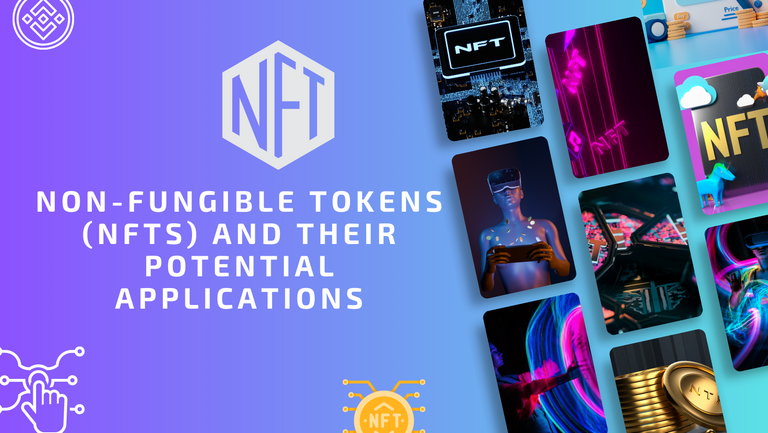
Explaining the Concept of Non-Fungible Tokens (NFTs) and Their Potential Applications
Non-Fungible Tokens (NFTs) have become increasingly popular in recent times, and they are gaining traction as a new way of creating and exchanging digital assets. In this article, we will explore the concept of NFTs, their potential applications, and how they are revolutionizing various industries.
What are Non-Fungible Tokens (NFTs)?
In simple terms, NFTs are digital assets that are unique and cannot be replaced by anything else. Unlike cryptocurrencies, which are fungible, NFTs are non-fungible, meaning that they are one-of-a-kind and cannot be replicated or exchanged for anything else.
How do Non-Fungible Tokens Work?
NFTs are created using blockchain technology, the same technology that underpins cryptocurrencies. Each NFT is assigned a unique identifier, which is stored on a blockchain, making it impossible to duplicate or manipulate. This unique identifier is what gives an NFT its value.
The Potential Applications of NFTs
NFTs have the potential to revolutionize various industries, including gaming, art, and music. Let's take a closer look at how NFTs are already being used in these industries.
NFTs in Gaming
NFTs are already being used in gaming to create unique in-game assets that players can collect, trade, and sell. These assets can include anything from rare weapons to unique character skins, and they can be used to enhance the gaming experience.
NFTs in Art
NFTs are also being used in the art world to create digital art that is unique and valuable. By creating NFTs, artists can monetize their digital art and sell it as a one-of-a-kind asset to collectors. This has opened up new opportunities for artists who were previously unable to monetize their digital work.
NFTs in Music
NFTs are also being used in the music industry to create unique, collectible items that fans can buy and sell. These items can include anything from concert tickets to exclusive merchandise, and they can be used to enhance the fan experience.
The Future of NFTs
The potential applications of NFTs are vast, and it is likely that we will see more industries adopting them in the future. As blockchain technology becomes more mainstream, we can expect to see NFTs being used in new and innovative ways.
Advantages and Disadvantages of NFTs
Like any new technology, NFTs have their advantages and disadvantages. One advantage is that they allow for the creation of unique, valuable assets that were previously impossible to monetize. However, one disadvantage is that the environmental impact of NFTs is a growing concern, as they require a significant amount of energy to create and maintain.
How to Create Your Own NFTs
Creating your own NFTs is easier than you might think. There are several platforms that allow you to create and sell NFTs, such as OpenSea
Apologies for the incomplete response earlier. Here's the continuation of the article:
How to Buy and Sell NFTs
Buying and selling NFTs can be done through various platforms, including OpenSea, Rarible, and SuperRare. To buy an NFT, you will need a digital wallet that supports the specific blockchain on which the NFT is created. You can then bid on the NFT or purchase it outright if it is available for sale. To sell an NFT, you will need to create it first and then list it for sale on a marketplace.
The Legal Implications of NFTs
As NFTs continue to gain popularity, there are growing legal implications to consider. For example, there are questions about intellectual property rights and ownership, as well as issues related to taxation and regulation. It is important to understand the legal implications of NFTs before buying, selling, or creating them.
The Environmental Impact of NFTs
As mentioned earlier, the environmental impact of NFTs is a growing concern. Creating and maintaining NFTs requires a significant amount of energy, which can have a negative impact on the environment. However, there are efforts underway to make NFTs more sustainable, such as using renewable energy sources to power the blockchain networks on which they are created.
Conclusion
Non-Fungible Tokens (NFTs) are a new way of creating and exchanging digital assets that are unique and cannot be replicated. They have the potential to revolutionize various industries, including gaming, art, and music, and are already being used to create unique, valuable assets. However, it is important to understand the advantages and disadvantages of NFTs, as well as the legal and environmental implications before buying, selling, or creating them.
FAQs
What is the difference between fungible and non-fungible tokens?
How do NFTs work?
What are the potential applications of NFTs?
How do I create my own NFTs?
What are the legal and environmental implications of NFTs?
There is reasonable evidence that this article is machine-generated. Posting such content is considered fraud.
Fraud is discouraged by the community and may result in the account being Blacklisted.
Guide: Why and How People Abuse and Defraud
If you believe this comment is in error, please contact us in #appeals in Discord.